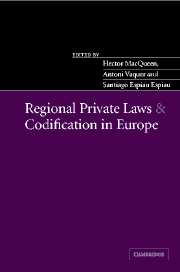Book contents
- Frontmatter
- Contents
- List of contributors
- Acknowledgements
- List of abbreviations
- Introduction
- 1 The civil law in European codes
- 2 ‘A token of independence’: debates on the history and development of Scots law
- 3 The Scottish civil code project
- 4 Scots law in Europe: the case of contract
- 5 Scottish property: a system of Civilian principle. But could it be codified?
- 6 ‘… Quae ad ius Cathalanicum pertinet’: the civil law of Catalonia, ius commune and the legal tradition
- 7 The codification of Catalan civil law
- 8 Unification of the European law of obligations and codification of Catalan civil law
- 9 From revocation to non-opposability: modern developments of the Paulian action
- 10 Epistle to Catalonia: romance and rentabilidad in an anglophone mixed jurisdiction
- 11 Estonia and the new civil law
- 12 The positive experience of the Civil Code of Quebec in the North American common law environment
- 13 From the code civil du bas Canada (1866) to the code civil Quebecois (1991), or from the consolidation to the reform of the law: a reflection for Catalonia
- 14 The evolution of the Greek civil law: from its Roman–Byzantine origins to its contemporary European orientation
- Index
4 - Scots law in Europe: the case of contract
Published online by Cambridge University Press: 30 July 2009
- Frontmatter
- Contents
- List of contributors
- Acknowledgements
- List of abbreviations
- Introduction
- 1 The civil law in European codes
- 2 ‘A token of independence’: debates on the history and development of Scots law
- 3 The Scottish civil code project
- 4 Scots law in Europe: the case of contract
- 5 Scottish property: a system of Civilian principle. But could it be codified?
- 6 ‘… Quae ad ius Cathalanicum pertinet’: the civil law of Catalonia, ius commune and the legal tradition
- 7 The codification of Catalan civil law
- 8 Unification of the European law of obligations and codification of Catalan civil law
- 9 From revocation to non-opposability: modern developments of the Paulian action
- 10 Epistle to Catalonia: romance and rentabilidad in an anglophone mixed jurisdiction
- 11 Estonia and the new civil law
- 12 The positive experience of the Civil Code of Quebec in the North American common law environment
- 13 From the code civil du bas Canada (1866) to the code civil Quebecois (1991), or from the consolidation to the reform of the law: a reflection for Catalonia
- 14 The evolution of the Greek civil law: from its Roman–Byzantine origins to its contemporary European orientation
- Index
Summary
Introduction
It is a crucial aspect of the history of Scots private law that in its history influences from the common law of England have been unavoidable from the beginning and waxed particularly strong after the Union of the Parliaments of the two kingdoms, with a common legislature, final court of appeal (the House of Lords) and the familiarity that comes from proximity, accessibility and a common language. But unlike English law, Scots law was also open from the very beginning to what was to become the Continental European ius commune (common law). The substance of the law was much affected by the universal law of the church (the canon law) and the Roman or Civil law taught in the Continental universities at which until the eighteenth century many Scots lawyers underwent their initial legal education. A further effect was that when Scots lawyers wrote treatises on their law, they used the systematics and concepts of the learned laws of Europe, further reinforcing its ius commune characteristics. If this Civilian dimension weakened after the 1707 Union, and in particular from the Victorian era on, Scots private law nonetheless remains significantly distinct from that of England, and in comparative law terms it is correctly classified as a ‘mixed’ system.
In 1924 the distinguished French comparatist Professor Lévy-Ullmann observed that ‘Scots law gives us a picture of what will be some day the law of the civilised nations, namely a combination between the Anglo-Saxon and the Continental system’.
- Type
- Chapter
- Information
- Regional Private Laws and Codification in Europe , pp. 102 - 117Publisher: Cambridge University PressPrint publication year: 2003



